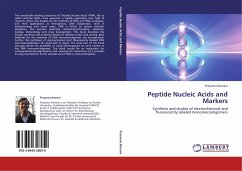High Quality Content by WIKIPEDIA articles! Peptide Nucleic Acid (PNA) is an artificially synthesized polymer similar to DNA or RNA invented by Peter E. Nielsen (Univ. Copenhagen), Michael Egholm (Univ. Copenhagen) , Rolf H. Berg (Risø National Lab) and Ole Buchardt (Univ. Copenhagen) in 1991 (Science, vol. 254 p 1497).DNA and RNA have a deoxyribose and ribose sugar backbone, respectively, whereas PNA's backbone is composed of repeating N-(2-aminoethyl)-glycine units linked by peptide bonds. PNA is not known to occur naturally. The various purine and pyrimidine bases are linked to the backbone by methylene carbonyl bonds. PNAs are depicted like peptides, with the N-terminus at the first (left) position and the C-terminus at the right.
Bitte wählen Sie Ihr Anliegen aus.
Rechnungen
Retourenschein anfordern
Bestellstatus
Storno








